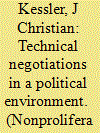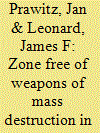|
|
|
Sort Order |
|
|
|
Items / Page
|
|
|
|
|
|
|
| Srl | Item |
| 1 |
ID:
083836


|
|
|
|
|
| Publication |
2008.
|
| Summary/Abstract |
This article examines whether and how the delegation of sovereign regulative powers in the nuclear field by states to supranational regional authorities can further nonproliferation purposes. More precisely, it asks whether the second Rome Treaty, which instituted the European Community of Atomic Energy (Euratom), could serve as a model for the creation of other regional authorities in the nuclear field, particularly among Middle Eastern and Arab nations. It argues that the Euratom Treaty provides interesting technical provisions, particularly regarding 1) safeguards against the diversion of fissile materials by state and non-state actors, 2) confidence-building measures for state actors when they establish R&D in nuclear technologies, and 3) fuel supply assurances for state actors. Building on archival research of the Euratom Treaty negotiations and the Euratom Commission, the article argues that, today, supranational provisions included in the Euratom Treaty would have stronger nonproliferation effects than looser forms of international cooperation. However, the article also points to specific weaknesses in the Euratom Treaty and outlines how legal scholars and diplomats can avoid some of its pitfalls.
|
|
|
|
|
|
|
|
|
|
|
|
|
|
|
|
| 2 |
ID:
166464


|
|
|
|
|
| Summary/Abstract |
One of the first pieces of legislation addressing the UK's departure from the EU/Euratom to complete its passage through Parliament is the Nuclear Safeguards Act 2018, which will enable the government to establish a domestic nuclear safeguards regime. This was driven by the need to prevent vulnerability to a vital energy system and indicates the short to medium term approach the UK has to its policymaking post-Brexit: dealing with issues immediately impacted, such as ensuring the continued supply of nuclear fuel. The contribution of this paper is the examination of two particular areas under the responsibility of Euratom – nuclear safeguards and radiation protection – that are presented to indicate the wider impact Brexit has in other areas currently the responsibility of the EU, for example, chemical safety. It shows that the UK has significant gaps in responsibility currently undertaken by Euratom (or other EU institutions) that need to be filled by UK bodies. Which bodies will assume these responsibilities and what resources will be available remain open questions. This case study highlights the need for systematic prioritisation by the UK government when filling the void of EU/Euratom institutions.
|
|
|
|
|
|
|
|
|
|
|
|
|
|
|
|
| 3 |
ID:
127127


|
|
|
|
|
| Publication |
2013.
|
| Summary/Abstract |
Despite a political environment fraught with core policy differences, between 1979 and 1983, six governments and two international safeguards directorates-the International Atomic Energy Agency and the Euratom Safeguards Directorate-negotiated an agreement to preserve the core verification principles behind the Treaty on the Non-Proliferation of Nuclear Weapons (NPT). At first, even agreement to talk was in doubt. Other governments questioned US motives; they wondered whether US motives in promoting the International Nuclear Fuel Cycle Evaluation had been to evaluate or to prevent non-nuclear weapon states from deploying uranium enrichment and spent fuel reprocessing technologies. In addition, Germany and Japan disagreed with the United States on whether NPT safeguards were to address undeclared materials or activities. Notwithstanding this environment, the participants reached agreement first to negotiate, and then on specific technical measures, even when the approach implied a policy consensus where none existed. At the conclusion, agreement was reached on specific technical measures for safeguards at gas centrifuge uranium enrichment plants, and all participating states, including two nuclear weapon states, made diplomatic commitments to adopt this approach for current and future centrifuge plants. This article examines the factors that facilitated agreement and considers what lessons can be learned for future efforts to solve complex technical issues in a politically charged environment and in the absence of complete agreement even on the objectives to be realized.
|
|
|
|
|
|
|
|
|
|
|
|
|
|
|
|
| 4 |
ID:
161017


|
|
|
|
|
| Summary/Abstract |
Drawing on declassified sources, this analysis examines how the Cold War influenced United States policy towards the creation of the European Atomic Energy Community [EURATOM]. In the 1950s, “the peaceful atom” became a crucial sector of the Cold War. To maintain American nuclear leadership, the Dwight Eisenhower Administration invited Western Europeans to enter into an active collaboration with the United States on peaceful uses of atomic energy. The United States encouraged the creation of EURATOM by promising that the Community would obtain more assistance in the nuclear field than any individual state. The Soviet launch of Sputnik provided additional impetus to the signing of the United States–EURATOM agreement, having strengthened American interest in a joint programme with EURATOM that would bring together American and Western European scientific and technical resources to counter the Soviet Union. The exegesis contributes to recent studies on the interaction between the Cold War and European integration.
|
|
|
|
|
|
|
|
|
|
|
|
|
|
|
|
| 5 |
ID:
006376


|
|
|
|
|
| Publication |
New York, United Nations, 1996.
|
| Description |
viii,134p.
|
| Standard Number |
9290451149
|
|
|
|
|
|
|
|
|
|
|
|
Copies: C:2/I:0,R:0,Q:0
Circulation
| Accession# | Call# | Current Location | Status | Policy | Location |
| 038068 | 355.820956/PRA 038068 | Main | On Shelf | General | |
| D38068 | 355.820956/PRA D38068 | Main | On Shelf | General | |
|
|
|
|
|
|
|
|
|